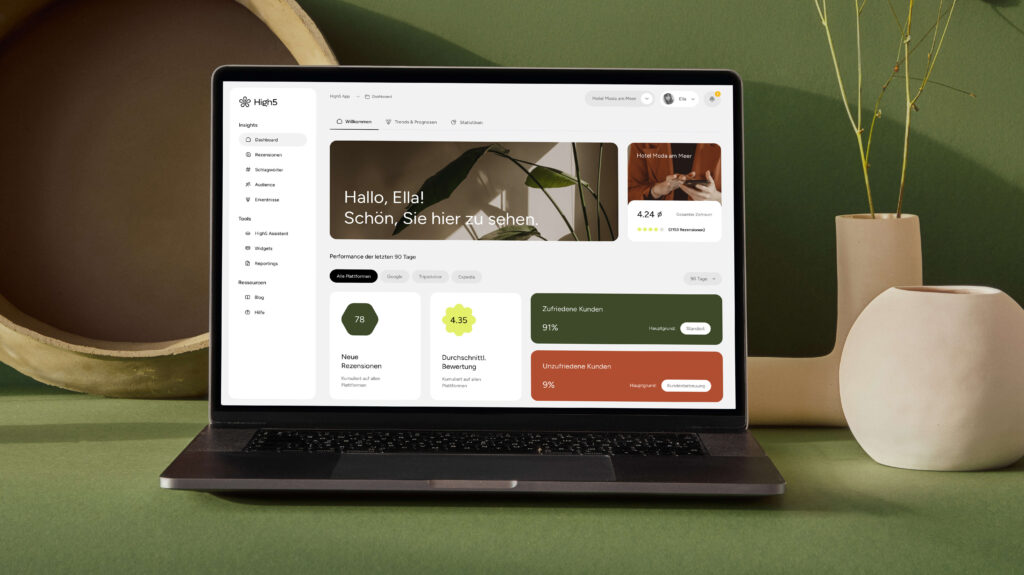Data as the Foundation for Personalized Experiences
In modern hospitality, it’s no longer just about providing guests with a clean room and friendly service. Today, guests expect more: a personalized experience. This is where data comes into play, and the digitalization of hotels begins.
By collecting information from previous stays, hotels can get to know their guests’ preferences in detail. Does the guest prefer a room in a quiet corner? Are they a fan of breakfast in bed? Or do they always need a firm pillow? All this information can be stored in a guest management system and used for future stays to provide a tailored experience. This type of personalization can make all the difference, encouraging guests to return and leave positive reviews.
Data Analysis: Identifying Trends and Taking Action

With modern tools, hotels can now collect and analyze more data than ever before. Analyzing this data allows them to identify guest trends and behavior patterns. For instance, analyzing booking data can reveal which room categories are in high demand during specific seasons or which additional services guests frequently book.
These insights enable hotels to take proactive measures and optimize their offerings. For example, if data shows that many guests use the wellness area during the winter months, the hotel can offer special winter wellness packages, boosting revenue. Data analysis helps make fact-based decisions and develop targeted marketing strategies.
With software like High5, which intelligently analyzes reviews, hotels automatically gain data-driven insights. This allows them to create tailored offers and experiences that perfectly match guest needs—while simultaneously improving satisfaction and revenue. Thanks to such benefits, including competitive advantages, digitalization has become indispensable for hotels today.
Real-Time Adjustments Through Data
A key development in the digitalization of hotels is the ability to respond to guests’ needs in real time. Imagine a guest expresses dissatisfaction with the cleanliness of their room during their stay. This information is immediately entered into the hotel’s central system and forwarded to the housekeeping team, which can take action right away. Quickly adapting to guest requests leads to improved service and leaves a positive impression.
Hotels can also use real-time data to identify up-selling or cross-selling opportunities. For example, if a guest asks for a late breakfast during check-in, the hotel could offer them special brunch deals through the in-house app during their stay. The ability to respond to guest requests in real time not only enhances the guest experience but also creates additional revenue opportunities.
Digitalization for Hotels: Automation Through Artificial Intelligence (AI)
Artificial intelligence (AI) is playing an increasingly important role in data-driven hospitality. Modern AI-powered systems can analyze guest data and automatically provide recommendations. For example, chatbots on hotel websites can answer frequently asked questions, make bookings, and even offer personalized suggestions based on guest data.
Another exciting aspect is the automatic review analysis powered by AI. This is where High5 software comes into play: High5 uses artificial intelligence to analyze guest reviews across various platforms. The software detects patterns in reviews, identifies positive and negative trends, and makes suggestions on how best to respond to each piece of feedback. Whether it’s a quick apology for a negative review or reinforcing a positive comment, High5 helps hotels respond to guest feedback faster and more efficiently.

By using High5, hotels can not only better understand guest feedback but also optimize communication and build stronger relationships with their guests. It shows guests that their feedback is taken seriously, ultimately enhancing the hotel’s reputation in the long term.
Proactive Guest Services Through Data Mining
With the right data analysis, hotels can not only respond to current guest requests but also accurately predict future needs. High5 goes far beyond traditional data analysis. It considers not only guest reviews and historical data but also analyzes current trends and crises in guests’ home countries in real time.
High5 can detect travel trends—such as a growing interest in sustainable tourism or regional experiences—as well as economic and political developments in guests’ home countries. These factors directly impact occupancy rates and the purchasing power of tourists. Whether it’s an economic upswing or a crisis, High5 helps create proactive, tailored offers that are precisely aligned with the situation and the guests’ preferences.
Challenges of Data-Driven Hospitality

Despite all the advantages that digitalization offers hotels, it also brings challenges. One of the biggest is data privacy. Guests must be able to trust that their data is secure and not being misused. Therefore, it is crucial to ensure transparency and clearly communicate to guests which data is being collected and how it is being used.
Another challenge is finding the right balance between personalization and privacy. Hotels must be careful that guests do not feel “monitored” by the information collected. Being too intrusive with data can quickly backfire and lead to negative reactions.
The Future is Data-Driven: But with a Human Touch
Data-driven guest services open up countless opportunities for the hospitality industry to enhance service and create a unique, personalized experience. Through data analysis, AI, and automation, hotels can proactively respond to guest needs and identify trends. Tools like High5 provide hotels with the ability to quickly and personally respond to guest feedback, continuously improving service quality. At the same time, it’s crucial to uphold data privacy and handle guest data with care. Only by doing so can hotels truly put guests at the center while fully embracing the opportunities of the digital world.
But this is just the beginning of the technological revolution in hospitality. Discover the exciting innovations already shaping the industry’s future in our article: Don’t miss the trends in the hotel industry in 2025: from smart rooms to self-service
Study on the Topic
A critical analysis of the literature highlights the importance of this data-driven approach for continuously improving guest service quality and adapting to guest expectations.
For more details on this topic and the specific methods of data analysis in hospitality, read the full study here.



